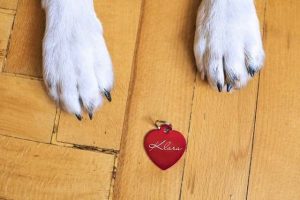WHY IS MY DOG DIGGING MY BED?

If you are here you probably have a dog that is busy from time to time trying to dig up something from your bed. You already know that the outcome of this action is not going to be good for you or your bed but it is obvious that your dog does not understand this. It leaves you asking yourself “Why is my dog digging my bed?”
The first thing you should know is that your dog trying to dig on your bed is borne out of natural instincts. The act is called “denning”, and your dog is not doing it to be mischievous. No, you see, back when they were still living in the wild, the natural instinct was to always hide. But the area where they hid needed to be safe from any danger and comfortable enough for them to sleep in. This was achieved by them digging holes in the ground which would not only hide them from possible predators but also keep them cool in the summer and warm and dry in the winter season.
Today, our dogs live with us in our houses, but the same survival instincts they had, when they were in the wild, are still present in them today.
Below are some answers to the question “Why is my dog digging my bed?”
To mark your bed.
If you find your dog digging in bed at night, your dog may be trying to mark that spot of the bed as his or her own territory. Do you have multiple dogs in your household? Are their other pets in your house? Are there too many people in the house?
Dogs that live in these situations are always looking for a place in the house where they can claim as their own. This behavior as we explained earlier is not borne out of bad behavior but out of survival instinct. Even in the wild, when dogs lived in packs, they dug their own spots and each dog in the pack understood which spot belongs to which dog. How can this be?
Well, at the footpad of every dog there are glands in them. These foot pads emit a scent that is unique to each dog. The more a dog uses a particular place, the stronger that scent for that dog. So when a dog digs a particular place, the scent from the glands in the paw becomes strong in that spot, especially to other dogs around. This way, they are able to mark the spot they dig on as their territory.
As far as the dog is not bullied out or intimidated into leaving that spot, that place remains his or her own and every other dog around that place knows it. This logic applies when a dog also starts to dig our bed.
To maintain their body temperature.
Why does my dog dig on my bed at night? Your dog may be doing this to control his or her body temperature. How can this be? Well first of all dogs have to really work hard to maintain their body temperature. On average, a dog’s body temperature ranges between 100 to 102.5 degrees Fahrenheit. This is quite higher than that of human beings. They try to maintain this temperature range by breathing in faster through their mouth when they feel hot and slower when they feel cold.
But there are situations where doing this is not enough and your dog would need a cool or warm surface to help regulate their body temperature based on the environmental temperature.
So when you find your dog digging your bed, they may be feeling too hot or too cold. The digging they are doing is a way of trying to adjust the temperature of that spot on the bed, granted that it looks ridiculous to us, we can bet you that your dog doesn’t share your line of reasoning here.
You can help out your dog here by investing in a fan or space heater for your dog depending on the temperature level. Just make sure that you do not leave this on throughout the day and when in use, make sure to be observant of your dog’s reaction to know when to turn them on or off.
To hide.
As we explained earlier, dogs dig out of instinct. They do this to create a perfect place where they can rest or sleep without worries. Apart from marking their spot, the place they dug needed to be safe in the wild. That means it needs to be able to hide them from predators and any other unpredictable danger.
Today, our dogs live with us. They are as protected as any animal can be, in most cases, they are even better protected than we are, but their natural instinct still drives them to dig your bed, especially when it is the spot they have chosen for them to rest in and feel safe.
Comfort.
Why does my dog dig at the blankets on my bed? A dog can be digging your bed because he or she wants to be comfortable before resting. Remember in the wild, a dog’s den is not just a spot for them, but also a place of safety and comfort. Just like what our bedroom and bed is to most of us. A sanctuary, a place of privacy, a secure and safe place. And our beds, a place of comfort, where most of us surrender ourselves to the warmth of the sheets and the bed.
If you are like most people, you will try to adjust some things on the bed, be it the blankets, bedsheets, or the pillow. Adjusting and rearranging these things gives us a level of imagined comfort. The act of adjusting and re-arranging our beds can be compared to a dog digging or trying to den. After all, the place where they have to sleep and relax in needs to be comfortable.
To create a nest for her puppies
One of the answers to the question “Why does my dog dig on my bed at night?” is that your dog is trying to make a nest. This is especially true in female dogs who are experiencing pregnancy, whether true or false. We as humans when pregnant start making future plans for our babies. For our dogs, what better way to make plans for unborn puppies than to prepare the best safest place for them to start their life.
Note that even dogs that have been spayed or neutered can also experience false pregnancy. This would make them dig too and if your bed is the preferred spot, well, you will find her there digging your bed. The best thing you can do for your dog at this stage is to keep her out of your room and take her to the vet doctor.
Curiosity.
Your dog may be digging a particular spot on your bed out of plain curiosity. The spot might give your dog the impression that there is something worthwhile underneath and your dog’s curiosity takes over. Will it find some hidden treasure down there? A special toy? A bone? Some unique object? Who knows what your dog thinks is there. He or she would not stop until they are either removed from the spot or damaged the same spot on the bed.
A group of people that are likely to experience this behavior are people who are fond of feeding and allowing their dogs to play with their toys on the bed. Some treats and bully sticks can leave a strong scent on the bed. The same way a spot on your bed can give your dog the impression that one of his favorite toys is stuck in that spot.
Removing your dog from your bed is a good place to start before reaching out to professionals for advice.
Anxiety.
Your dog can also be digging your bed due to anxiety. This is especially true for dogs that are suffering from separation anxiety. When left alone, their actions would escalate and border around compulsive behavior, pooing and peeing indoors, destroying your clothes, footwear, furniture, etc., and generally being a nuisance.
You can learn more about DEALING WITH SEPARATION ANXIETY IN DOGS here.

So these are the answer to the question “Why is my dog digging my bed?” The next phase would be what can I do to stop my dog from digging my bed?
Control access to your bed.
Keeping your dog off your bed and the bedroom, in general, should be the first thing you should do. If your dog doesn’t have access to your bed, he or she cannot dig it and cause havoc for you. Doing this helps to establish some form of boundary and with time your dog starts to understand that his or her behavior is not acceptable.
So, how can you keep your dog out of your bed? How can you really control your dog’s access to your bed? Here are some methods you may consider using in doing this.
i.Quickly begin Obedience Training: If you have not started obedience training with your dog. This is the perfect time to start. You should lay the foundation for how you should be interacting and communicating with your dog. This also will help to set boundaries in how your dog would behave around you.
ii. Invest in a Pet fence: These Pet fences are very effective at keeping dogs out of areas where you do not want your dog in. This is because they provide a physical blockage for your dog, restricting their access in a way which they cannot bypass even if they are the stubborn type. Your only obligation is to purchase the appropriate size of pet fence which is actually dependent on the size of your dog.
iii. Only allow your dog access to your bed when you are there: This goes hand in hand with Obedience training. You allow your dog into your bed when you are there and control the outcome of events.
iv. Use a Scent Deterrent: This should only be done in extreme situations. Whenever a scent deterrent is used, your dog is never likely to come back to that spot again. The result is mostly permanent or lasts a longer period of time. Some examples of scent deterrents are citrus, pepper, ammonia, mothballs, cayenne, red pepper, and vinegar.
Trim their nails.
Your dog will benefit from getting its nails trimmed regularly. Just doing this will help to minimize the damage your dog can do to your bed. That is if he or she somehow finds their way to your bed even after all the boundaries you have put up for them.
On average, trimming your dog’s nails every three or four weeks should be ok for them. This not only minimizes the damage their nails can do to your bed and furniture in general, but it also reduces the possibility of your dog getting an infection or wounding themselves.
Invest in a Dog Bed.
Since we already have an idea why our dogs like to dig. Why not provide them with an alternative that takes this into consideration and heavily reduces the need for your dog to dig. A dog bed does exactly that. They are designed to give your dog the comfort, security, and every other need your dog desires.
Dog beds come in varieties, from memory foam beds, orthopedic beds to beds for arthritis, big dogs, and small dogs. You can learn more about dog beds here WHAT IS THE BEST DOG BED ON THE MARKET?
Crate train your dog
One of the best ways to get your dog to stop digging your bed is to acquire a dog crate and do crate training for them. Crate training your dog will give him or her a sense of belonging in the house as well as provide the safety, comfort, and security your dog desires. All these combined take away your dog’s reason to dig.
You can learn more about dog crates here BEST CRATE FOR DOGS
Consult a proffessional.
When all fails, you will have to consult a professional to help you out. You see, sometimes the habit of digging your bed can be compulsive bordering on sycophancy. At this stage, no simple technique or trick would work on your dog. It will have to be a combination of some medication and behavioral diversion techniques that will help steer our dog away from such unhealthy behavior.
OTHER BEHAVIOURS YOUR DOG CAN EXHIBIT BEFORE SLEEPING
Walking in Circles: Your dog may walk in circles before settling down or dig and walk in circles before settling down. The walking in circles is their way of getting a 360 view of their surrounding to be sure they are safe before settling down.
Snuggling together: Dogs in a pack in the wild snuggle up to each other not just to provide warmth to each other but also as a way to watch over each other. Today we and other pets in the household are part of the new pack. The dangers of today are quite less than what they were in the wild, but even you would agree that snuggling together can actually be nice.
Scratching the bed: Digging and scratching actually go hand in hand, the marks on the bed surface are more likely to be from scratching than digging.
Sighing: Doing this just before sleeping can be a dog’s way of saying the day was worthwhile. Your dog is saying, today is a good day and I am ready to take my beauty sleep.
DOG CARE
DOG PRODUCTS
DOG BREEDS

Hi, I am Charles Nwankwo Editor-in-Chief, Mydoggything.com. Gleaning from Professional Dog Trainers, behaviorist, Registered Veterinarians, and Breeders. We are passionate about making dog care easy for you. My job is to make sure that you get the best-updated dog care information to understand and take care of your dog or dogs.








